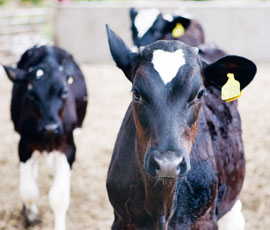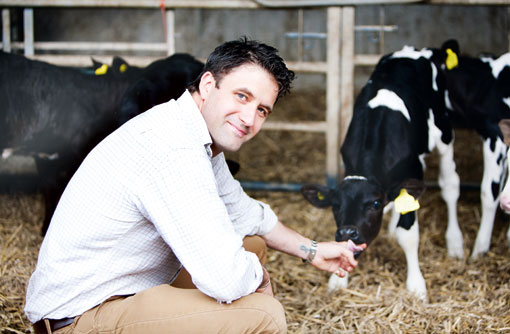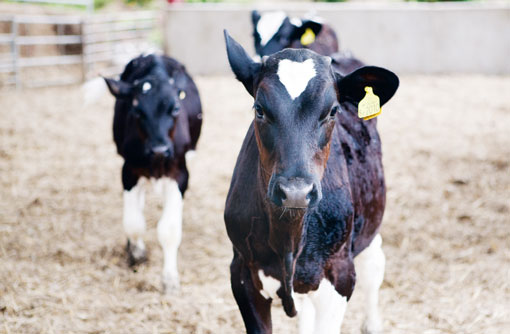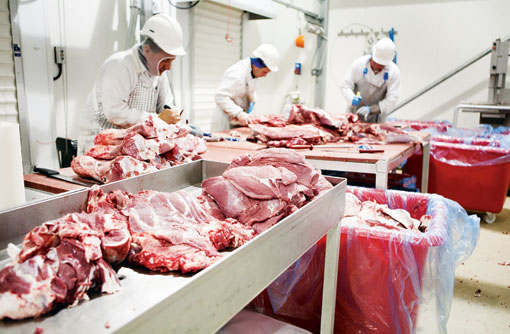High-welfare veal is back on the menu

From the in-vogue decade of the 1960s when 616,000 calves a year were finished as veal, to the crash years of the 1980s when production dropped to some 35,000 a year, there’s no doubt British veal production has been on a roller-coaster ride.
However, recent media coverage, such as appearances on Countryfile and Jimmy and the Giant Supermarket, and a public endorsement of the benefits of eating veal from the RSPCA, have meant production is very much on an upward climb.
One Dorset dairy producer has been at the forefront of the British market’s revival. Born out of a steadfast refusal to shoot dairy bull calves and a drive to find a solution to TB restrictions, David Tory’s vision has developed into a veal business with a £1.6m turnover in less than three years.
Market share
Brookfield Farm is now the biggest veal brand in Britain, taking about 75% of the market share for calves finished under eight months of age. And demand is outstripping supply by the day.
Initially rearing his own black and white bulls from his herd of 220 cows at Tarrant Crawford and Abbey Farms, Mr Tory now takes calves from more than 90 farms in the South West.

“When I came back to the dairy business 16 years ago, one of my first jobs was shooting dairy bull calves, which never sat right with my sensibilities,” he says. “I started sending calves to market, but I occasionally got a bill back.”
Having been shut down with TB for the first time 10 years ago, market options were further reduced and Mr Tory began to rear calves on farm.
“At this stage we hadn’t even thought about veal – we just wanted an option of how to deal with surplus beef. The idea was to take black and white beef to slaughter at 14-15 months of age.
A turning point came when Ben Bayer of meat producer DB Foods bought a neighbouring farm. Various meetings led to the development of the Brookfield Farm brand.
The pair decided to go into business together and in 2010 set up Tarrant Valley Livestock to exclusively supply Brookfield Farm branded produce. Tarrant Valley is split 50:50 between Mr Tory and DB Foods.
Freedom Food
To fit with the high-welfare image, it was important for the Brookfield Farm brand to be Freedom Food accredited. However, this meant calves had to be brought on to the farm at less than 42 days of age, and at the start of 2011 they were weaning about 25 animals a week.
“To start with we were selling about five out of these 25 as veal into catering butchers, but the demand wasn’t massive.
“At the time I was developing relationships with Compassion in World Farming, Freedom Foods and our vet Damory Vet Clinic – all these relationships go hand in hand. We wanted to tell what we were doing in terms of high welfare and saving calves from being shot.

“The veal market died in the early 90s with the public perception of baby calves in light-restricted crates. If veal hadn’t been an ostracised product, a brand may not have been as necessary. But having a high-welfare image and strong brand has paid dividends.”
During the whole of this process, a dedicated salesman at DB Foods was tasked with the job of contacting retailers. “We were approaching retailers all the time and pitched properly to a couple of big supermarkets,” says Mr Tory.
“However, we had turned down an offer from one supermarket to sell our produce as its own-brand product – it was important for us to sell our own high-welfare product.”

However, after winning the CIWF Good Calf Award for high welfare, the Brookfield Farm brand won a contract with a leading high-class multiple retailer to supply seven to eight veal carcasses a week.
“We are supplying cuts including osso buco, medallion, escalopes, chops and liver. Price negotiation is an ongoing process, but the retailer takes about a 30% cut of what they sell for. We are the biggest producer in the country so we do have a degree of control over the price.”
A key piece of advice, says Mr Tory, is to manage supermarket expectations.
“You need to have a good story to tell with your product and tick all the boxes. It’s the same regardless of whether you’re producing veal or cabbages.
“The supermarkets expect strict protocols on all aspects of production – housing, transport, welfare, for example – and they will ask for a lot of information.
“They like to exact control, which I sometimes find difficult, but you have to understand that they are your customer, and they are supplying the needs of their customers.”
Supermarkets paid several visits to Mr Tory’s farm before deciding whether to stock the product.
Business relationship
Mr Tory believes the main advantage to the business is the relationship with DB Foods and the ability it brings to balance the carcass for the supermarket. “Because we can balance the carcass and sell the forequarters into the EU, it significantly stabilises the price of our product into the supermarkets,” he says.
They now supply 70 calves a week to three leading supermarkets, one online store and various catering outlets. This compares with 17 carcasses a week just 12 months ago. The aim now is to increase production to 200 by the same time next year.
The business has taken off to such an extent that Tarrant Valley Livestock has been almost entirely finishing veal for the past eight months and collects from 80-90 farms across the West Country.
In fact, demand is so high that Mr Tory is setting up a Tarrant Valley Livestock Producer Group to increase production. “I need to take on more producers so I’m looking for dairy farmers in the South West to supply us.”
Cost: benefit of rearing veal
A 200-cow dairy unit could add £15,000-20,000 to its bottom line by rearing black and white calves for veal. David Tory carried out an experiment on his dairy unit to rear calves in line with Freedom Food guidelines and found that dairy producers could make a 40-60% profit on dairy bull calves. “It costs £1.80-2/kg to rear a calf and Tarrant Valley Livestock will buy them for £3.25/kg at an average deadweight of 125-145kg.”
Lessons learned
- Produce an equitable and sustainable business model
- A strong farmer/processor alliance is key
- Ensure you have a good market and you are driving demand
- Producing a high-welfare brand has paid dividends
- Relationship with CIWF and Freedom Foods has helped improve image of veal
- Choosing the right working partners and sticking with them and developing together will help drive business forward
